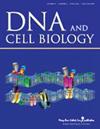芦丁通过CBS介导的RhoA/ROCK信号抑制骨关节炎的进展。
IF 2.6
4区 生物学
Q3 BIOCHEMISTRY & MOLECULAR BIOLOGY
引用次数: 4
摘要
骨关节炎(OA)是一种以关节软骨和软骨下骨退化为特征的慢性关节疾病。目前,OA还没有完全治愈的方法,只有旨在暂时缓解疼痛和改善功能的治疗方法。与手术治疗的高成本相比,OA的医疗治疗更容易接受,也更具成本效益。芦丁作为一种黄酮类化合物,已被证明具有抗OA的特性。我们评估了芦丁对脂多糖(LPS)诱导的OA软骨细胞和前交叉韧带横断诱导的大鼠OA的影响。我们发现芦丁有效地降低了诱导型一氧化氮合酶(iNOS)、环氧合酶-2(COX-2)、肿瘤坏死因子-α(TNF-α)和基质金属蛋白酶13(MMP-13)的表达水平,并增加了Col II和聚集蛋白聚糖的表达(p < 此外,我们还发现芦丁增加了软骨细胞中胱硫醚-β-合成酶(CBS)的表达,并抑制了Rho相关卷曲螺旋蛋白激酶(ROCK)的表达(p < 0.05),从而有效抑制OA的炎症进展。我们得出结论,芦丁通过CBS介导的RhoA/ROCK信号通路抑制OA的炎症进展。本文章由计算机程序翻译,如有差异,请以英文原文为准。
Rutin Inhibits the Progression of Osteoarthritis Through CBS-Mediated RhoA/ROCK Signaling.
Osteoarthritis (OA) is a chronic joint disease characterized by the deterioration of cartilage and subchondral bone in the joints. Currently, there is no complete cure for OA, only treatments designed to temporarily relieve pain and improve function. Compared with the high cost of surgical treatment, medical treatment of OA is more acceptable and cost-effective. Rutin, as a flavonoid, has been shown to have anti-OA properties. We evaluated the effects of rutin on chondrocytes in lipopolysaccharide (LPS)-induced OA and on OA in rats induced by anterior cruciate ligament transection. We found that rutin effectively reduced the expression levels of inducible nitric oxide synthase (iNOS), cyclooxygenase-2 (COX-2), tumor necrosis factor-α (TNF-α), and matrix metalloproteinase 13 (MMP-13) and increased the expression of Col II and aggrecan (p < 0.001). In addition, we also found that rutin increased the expression of cystathionine-β-synthase (CBS) and inhibited the expression of Rho-related coiled-coil protein kinase (ROCK) in chondrocytes (p < 0.05), thereby effectively inhibiting the inflammatory progression of OA. We concluded that rutin inhibits the inflammatory progression of OA through the CBS-mediated RhoA/ROCK signaling pathway.
求助全文
通过发布文献求助,成功后即可免费获取论文全文。
去求助
来源期刊

DNA and cell biology
生物-生化与分子生物学
CiteScore
6.60
自引率
0.00%
发文量
93
审稿时长
1.5 months
期刊介绍:
DNA and Cell Biology delivers authoritative, peer-reviewed research on all aspects of molecular and cellular biology, with a unique focus on combining mechanistic and clinical studies to drive the field forward.
DNA and Cell Biology coverage includes:
Gene Structure, Function, and Regulation
Gene regulation
Molecular mechanisms of cell activation
Mechanisms of transcriptional, translational, or epigenetic control of gene expression
Molecular Medicine
Molecular pathogenesis
Genetic approaches to cancer and autoimmune diseases
Translational studies in cell and molecular biology
Cellular Organelles
Autophagy
Apoptosis
P bodies
Peroxisosomes
Protein Biosynthesis and Degradation
Regulation of protein synthesis
Post-translational modifications
Control of degradation
Cell-Autonomous Inflammation and Host Cell Response to Infection
Responses to cytokines and other physiological mediators
Evasive pathways of pathogens.
 求助内容:
求助内容: 应助结果提醒方式:
应助结果提醒方式:


